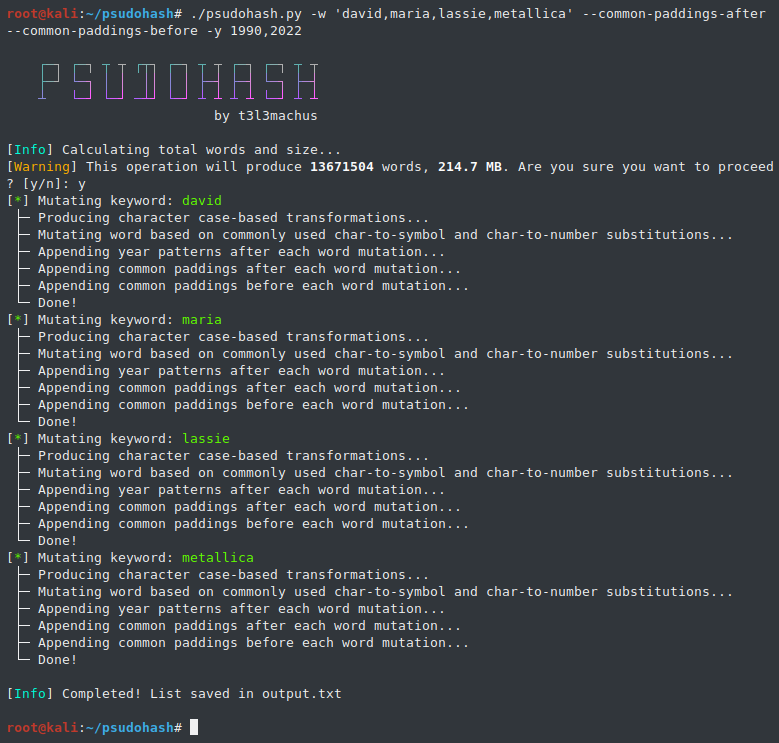Psudohash is a password list generator for orchestrating brute force attacks and cracking hashes. It imitates certain password creation patterns commonly used by humans, like substituting a word's letters with symbols or numbers (leet), using char-case variations, adding a common padding before or after the main passphrase and more. It is keyword-based and highly customizable. 🎥 -> Video Presentation
System administrators and other employees often use a mutated version of the Company's name to set passwords (e.g. Am@z0n_2022). This is commonly the case for network devices (Wi-Fi access points, switches, routers, etc), application or even domain accounts. With the most basic options, psudohash can generate a wordlist with all possible mutations of one or multiple keywords, based on common character substitution patterns (customizable), case variations, strings commonly used as padding and more. Take a look at the following example:
The script implements the following character substitution schema. You can add/modify character substitution mappings by editing the transformations list in psudohash.py and following the data structure presented below (default):
transformations = [
{'a' : ['@', '4']},
{'b' : '8'},
{'e' : '3'},
{'g' : ['9', '6']},
{'i' : ['1', '!']},
{'o' : '0'},
{'s' : ['$', '5']},
{'t' : '7'}
]
When setting passwords, I believe it's pretty standard to add a sequence of characters before and/or after the main passphrase to make it "stronger". For example, one may set a password "dragon" and add a value like "!!!" or "!@#" at the end, resulting in "dragon!!!", "dragon!@#", etc. Psudohash reads such values from common_padding_values.txt and uses them to mutate the provided keywords by appending them before (-cpb) or after (-cpa) each generated keyword variation. You can modify it as you see fit.
When appending a year value to a mutated keyword, psudohash will do so by utilizing various seperators. by default, it will use the following seperators which you can modify by editing the year_seperators list:
year_seperators = ['', '_', '-', '@']
For example, if the given keyword is "amazon" and option -y 2023 was used, the output will include "amazon2023", "amazon_2023", "amazon-2023", "amazon@2023", "amazon23", "amazon_23", "amazon-23", "amazon@23".
No special requirements. Just clone the repo and make the script executable:
git clone https://github.com/t3l3machus/psudohash
cd ./psudohash
chmod +x psudohash.py
./psudohash.py [-h] -w WORDS [-an LEVEL] [-nl LIMIT] [-y YEARS] [-ap VALUES] [-cpb] [-cpa] [-cpo] [-o FILENAME] [-q]
The help dialog [ -h, --help ] includes usage details and examples.
- Combining options
--yearsand--append-numberingwith a--numbering-limit≥ last two digits of any year input, will most likely produce duplicate words because of the mutation patterns implemented by the tool. - If you add custom padding values and/or modify the predefined common padding values in the source code, in combination with multiple optional parameters, there is a small chance of duplicate words occurring. psudohash includes word filtering controls but for speed's sake, those are limited.
When it comes to people, i think we all have (more or less) set passwords using a mutation of one or more words that mean something to us e.g., our name or wife/kid/pet/band names, sticking the year we were born at the end or maybe a super secure padding like "!@#". Well, guess what?
I'm gathering information regarding commonly used password creation patterns to enhance the tool's capabilities.






